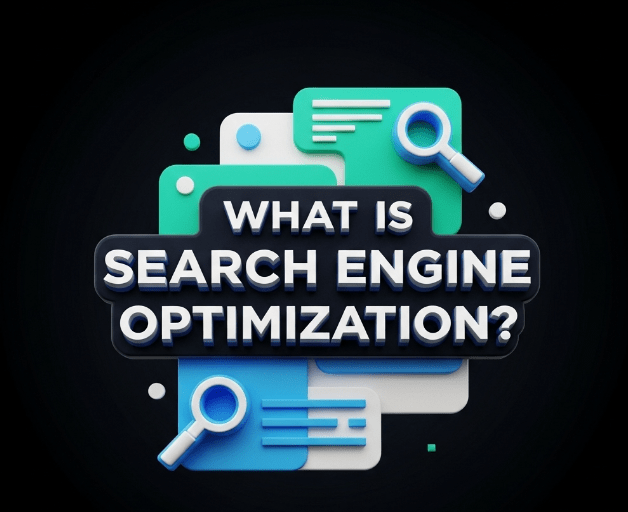Introduction
In the ever-evolving digital world, having a stunning website or unique product is no longer enough. If your audience can’t find you online, your efforts may go unnoticed. This is where Search Engine Optimization (SEO) plays a transformative role. As a cornerstone of digital marketing, SEO helps businesses rank higher on search engines, increase traffic, and boost conversions — all without paying for ads.

What is Search Engine Optimization?
Search Engine Optimization, commonly known as SEO, is the practice of optimizing a website to improve its visibility in search engine results pages (SERPs). It involves strategic techniques and best practices aimed at increasing organic (non-paid) traffic. The primary goal of SEO is to make your website more attractive to search engines like Google, Bing, and Yahoo.
When users type a query into a search engine, an algorithm sifts through billions of web pages to deliver the most relevant results. SEO helps your website stand out in this process by ensuring that your content aligns with the search engine’s ranking criteria.
Boost Your Online Visibility with Expert SEO Services!
Fill out the form below to get a FREE consultation and discover how our SEO strategies can skyrocket your rankings, traffic, and sales.
Why is Search Engine Optimization Important for Your Business?
SEO is essential because most online experiences begin with a search engine. Statistics show that over 90% of online experiences start with a search, and 75% of users never scroll past the first page of search results. If your business doesn’t rank well for relevant keywords, you’re missing a massive opportunity to attract customers.
Here are some critical benefits of Search Engine Optimization:
- Increased visibility and brand awareness
- Higher web traffic from relevant audiences
- Improved user experience on your site
- Cost-effective lead generation
- Long-term ROI compared to paid advertising
How Search Engines Rank Websites
Understanding how search engines work is key to optimizing your site effectively. While search engines use complex algorithms, the core ranking factors remain consistent:
1. Content Quality
Search engines prioritize websites that provide high-quality, relevant, and original content. Content must match the user’s search intent and provide value.
2. Keywords and On-Page Optimization
Proper use of keywords in titles, headings, meta descriptions, URLs, and body text tells search engines what your page is about.
3. Backlinks
Links from other reputable websites signal trust and authority. The more high-quality backlinks you have, the more likely your site is to rank well.
4. Technical SEO
This includes website speed, mobile-friendliness, secure browsing (HTTPS), and structured data markup. These elements ensure that search engines can crawl and index your site efficiently.
5. User Engagement
Metrics such as click-through rate (CTR), bounce rate, and time on site are increasingly influential in SEO rankings. Engaging content keeps visitors on your page longer.
Types of SEO
SEO is multifaceted. To succeed, you need to understand and implement several types of SEO:
1. On-Page SEO
This refers to optimizations made directly on your website. It includes keyword usage, HTML tags, internal linking, and content formatting.
2. Off-Page SEO
Off-page SEO focuses on building your site’s authority through backlinks, social signals, guest posts, and brand mentions on external platforms.
3. Technical SEO
This involves optimizing your site’s infrastructure to help search engines crawl and index your site. Examples include optimizing your sitemap, improving load speed, and eliminating broken links.
4. Local SEO
For businesses targeting a local audience, local SEO helps you appear in geographically related searches, especially within Google Maps and local listings.
How to Get Started with SEO
Whether you’re a business owner or a digital marketer, implementing an effective SEO strategy involves several key steps:
Step 1: Keyword Research
Identify the terms and phrases your audience uses to find products or services like yours. Use tools like Google Keyword Planner or manual search suggestions to find relevant keywords.
Step 2: Optimize Your Content
Create content that answers users’ questions. Include your primary keyword naturally in the title, headers, meta description, and throughout the body text.
Step 3: Improve User Experience
A good website should be fast, mobile-friendly, and easy to navigate. Use clear CTAs (calls-to-action) and ensure your design enhances readability.
Step 4: Build Backlinks
Reach out to blogs, news sites, and industry publications to earn backlinks. This not only drives referral traffic but also signals authority to search engines.
Step 5: Monitor and Update
SEO isn’t a one-time task. Use tools like Google Analytics and Search Console to track performance. Regularly update your content to keep it relevant.
Common SEO Mistakes to Avoid
While learning SEO, it’s easy to make mistakes. Here are some pitfalls you should steer clear of:
- Keyword stuffing: Overusing keywords can hurt your rankings.
- Ignoring mobile optimization: Most searches now happen on mobile devices.
- Neglecting meta tags: Title and description tags help search engines understand your content.
- Using low-quality backlinks: Spammy links can lead to penalties.
- Publishing thin content: Pages with little to no useful information will not rank well.
SEO Trends to Watch in 2025
SEO continues to evolve, and staying ahead of the curve is critical. Here are a few emerging trends:
- AI and Machine Learning: Search engines are becoming smarter at understanding content.
- Voice Search: With smart speakers and virtual assistants, optimizing for voice queries is gaining importance.
- Video SEO: Video content is growing; optimizing videos for search can boost visibility.
- E-E-A-T Framework: Google evaluates content based on Experience, Expertise, Authoritativeness, and Trustworthiness.
Measuring SEO Success
You need to track key metrics to understand if your SEO efforts are working:
- Organic Traffic: The number of visitors from search engines
- Keyword Rankings: Where your site appears in search results
- Click-Through Rate (CTR): How often users click on your links
- Bounce Rate: Percentage of users who leave after viewing one page
- Conversion Rate: Visitors who take the desired action (e.g., form fill or purchase)
Final Thoughts
Search Engine Optimization is not just a marketing tactic; it’s a business necessity in the digital age. It levels the playing field by allowing even small businesses to compete with larger brands for visibility and trust online.
Whether you’re an entrepreneur, a marketer, or a content creator, investing in SEO means investing in the long-term success of your online presence. By understanding how search engines work, creating quality content, and staying updated on trends, you can position your brand exactly where it needs to be — at the top of search results.










